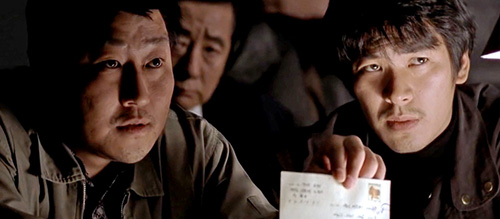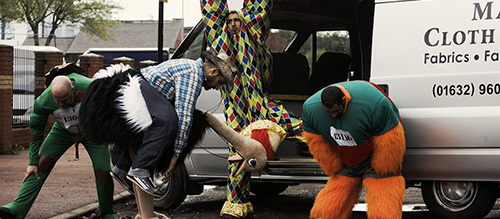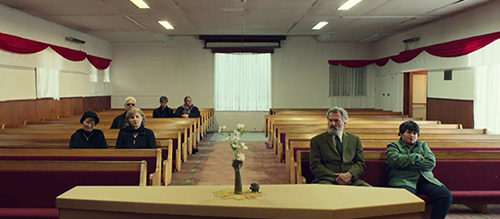The Fine Art of Black Comedy or Why It’s OK to Laugh When We Shouldn’t
If a film director brings two competing, juxtaposed, even jarring elements of storytelling together and somehow manages to make them achieve harmony, people will remember it. Working in a visual medium, filmmakers often use tonally contrasting material to get a particular reaction from the viewer and to leave a lasting impression. Because we humans, as a species, like to laugh and, to a lesser extent, think, one of the most common techniques employed is the use of dark, or black comedy, where something is undeniably funny and yet quite horrific at the same time. What follows are three scenes that demonstrate the effectiveness of black comedy as a storytelling tool in cinema.
South Korean auteur Bong Joon-ho’s Memories of Murder is set after his country came under martial law following the assassination of President Park in 1979; an incredibly dark chapter in his country’s history. With the country under the grip of a military dictatorship that suppresses and brutally punishes any organised protest, the film follows a team of inept police detectives struggling to apprehend a serial killer as the body count continues to rise.
The detectives are not above adopting the same questionable oppressive methods as their governmental superiors, attempting to pin blame on Kwang-ho (Park No-shik) a local man with learning difficulties who is highly prone to manipulation. They beat him terribly when asking him nicely to be their scapegoat doesn’t yield results, and they flip-flop between acting as his best friends and his worst nightmares. His main abuser, the particularly heavy-handed Detective Cho (Kim Roe-ha) has the habit of donning a flowery pink shoe cover to stop his military boots scuffing. In a key scene, after a severe bout of torture, they sit him down with a bowl of noodles to watch a goofy soap opera.
The point being made by Bong here is a political one. A native Korean director is making a painful passage in his country’s history and their people’s past oppressors look ridiculous, inept and crude, while in the process aiding the Korean national psyche in overcoming its past traumas. Black comedy can be therapeutic and Memories of Murder is the perfect evidence of this.
Best known for headlining anarchic current affairs spoof shows ‘Brass Eye’ and ‘The Day Today’, Chris Morris made his feature directorial debut with Four Lions, a comedy following a Sheffield-based terrorist cell planning a suicide bombing.
There’s no escaping how evil our “protagonists” are, how their ultimate aim is to kill as many innocents as possible in service of fundamentalist reading of their religious doctrine. Our de facto hero Omar (Riz Ahmed) even goes as far as indoctrinating his young son with bedtime stories about “Simba’s Jihad”. Several of the group accidentally and clumsily killing themselves along the way is terrible, but importantly funny. Police snipers debating the difference between bears, honey monsters and wookiees, shooting an innocent costumed marathon runner instead of a costumed terrorist in the process is awful, but importantly funny.
It’s a hard balance to strike, making fun of real-world monsters and limiting their power to scare and intimidate us while stopping short of trivialising the acts of terror themselves. Four Lions deftly walks that line, and in an era of heightened tension too, assisted no end by black comedy. Black comedy can be a satirical weapon.
Before working for Marvel, New Zealand actor-director Taika Waititi made a name for himself working on ‘Flight of the Concords’ and indie crowd-pleasers Boy and Hunt for the Wilderpeople.
Wilderpeople follows Ricky Baker (Julian Dennison), a troubled foster kid who is placed with the kindly Bella (Rima Te Wiata) and her grouchy husband Hec (Sam Neill).
When Bella suddenly dies just as this new family unit is growing close, we go straight into the obligatory funeral scene. Since death is now involved, this crosses over into the territory of black comedy’s cousin-once-removed, gallows humour. This is a heartbreaking moment in the film and in most cases would be presented as a straightforward dramatic beat, but Waititi is too clever to conform to convention. He takes the most sombre occasion there is and makes it absurd, with the minister (played by an unhinged Waititi) going off on strange tangents about doors and orange Fanta mid-eulogy.
The purpose of the scene within the film is to diffuse tension, to provide an emotional release both for the viewer and for Ricky and Hec. It’s saying that life goes on, that there’s always something to laugh at, even at a funeral, even if it’s inappropriate. Black comedy can be cathartic like that, and many other things besides.
By Sam Sewell-Peterson
You can support Sam at the following links:
Website – SSP Thinks Film
Twitter – @SSPThinksFilm




